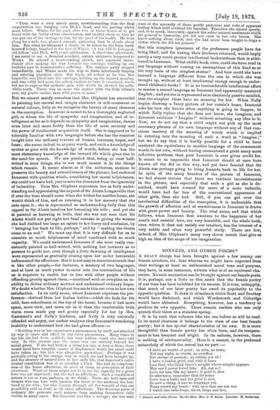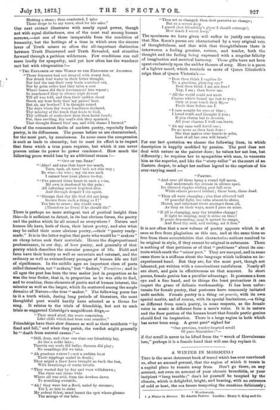SONNETS, AND OTHER POEMS.*
A HEAVY charge has been brought against a few among our female novelists, viz., that whereas we might have expected from their writings at least an unblemished moral tone and purpose,
they have, in some instances, written what is of an equivocal cha- racter. No such accusation can be brought against our female poets. It is, perhaps, not a little to this merit that the female poetry of our time has been indebted for its success. It is true, unhappily, that much of our later poetry has owed its popularity to the opposite qualities. It deals in stimulants which Scott and Southey would have disdained, and which Wordsworth and Coleridge would have abhorred. Everything, however, has a tendency to produce its own opposite. There remain readers who can only quench their thirst at a stainless spring.
It is by such that volumes like the one before us will be read. In its moral clearness it belongs to the class of our beat female poetry ; but it has special characteristics of its own. It is more thoughtful than female poetry has often been, and its tempera- ment is less buoyant and bright. In its sadness, however, there is nothing of sentimentality. Here is a sonnet, in the profound melancholy of which the unreal has no part
have no wealth of grief ; no sobs, no tears, Not any sighs, no words, no overflow
Nor storms of passion; no reliefs, yet oh !
I have a leaden grief, and with it fears
Lest they who think there's nought where nought appears May say I never loved him. Ah, not so!
Love for him fills my heart ; if grief is slow In utterance, remember that for years Love was a habit and the grief is new, So new a thing, it has no language yet.
Tears crowd my heart : with eyes that are not wet I watch the rain-drops, silent, large and few,
• 'Sonnets, and other Poems. By the Hon. Mrs. 0. M. Knox. London: H. Sothersn.
Blotting a stone ; then comforted, I take Those drops to be my tears, shed for his sake."
Our next extract illustrates with nearly equal power, though not with equal distinctness, one of the most real among human sorrows,—not one of those inseparable from the condition of humanity, but the heritage of a time in which even the sincere lover of Truth misses so often the all-important distinction between Truth Discovered and Truth Revealed, and stumbles forward through a pathless wilderness. Few conditions can call more loudly for sympathy, and yet how often has the wanderer met but with vituperation !—
" THE EXPLORER OF THIS WORLD TO THE EXPLORER OF ANOTHER.
"Those listeners had not strayed with weary feet, Nor drunk foul water in their bitter drought, Nor had the sun their very brain searched out, Nor by grim relics had they ta'en a seat Where bones did their forerunners' fate repeat ; So hearkened they in silence nigh devout Till all was told, and then their sudden shout Shook my lean body thro' my pulses' beat.
But ah, my brother! I in thought retrod The days when thy worse loneliness declared, Thy missing of the track that leads to God, Thy solitude of soul—how then thou hadst fared ; For, thee reviling, thy soul's risk they spurned; That thought flamed thro' me, and with shame I burned."
One of the commonest faults of modern poetry, especially female poetry, is its diffuseness. The poems before us are characterised, for the most part, by conciseness. In some cases the compression is such as leads to obscurity, but in most its effect is to impart that force which a true poem requires, but which it can never possess unless its power be power condensed. How much the following poem would lose by an additional stanza !— " OUT OF THE DEEP.'
"'Alas! sad eyes that know too much, Turn, turn, oh turn! look not this 'way; Be wise—be wise ; my sin was such I cannot bear your glance to-day.
• "'I've pierced thine heart in such a wise, My own is deadened by thy pain : All softening sorrow hopeless dies, And through despair I sin again.
"'Strange that thy life God did not keep Secure from such a thing as I!' Too late to sever ; she would weep (Therefore he lives) if he should die."
There is perhaps no more stringent test of poetical insight than this—Is it sufficient to detect, in its less obvious forms, the poetry and the pathos which lie all around us everywhere ? Nature and human life have, both of them, their latent poetry, and also what may be called their more obvious poetry,—their "poetry ready- made." It is in the latter region that poets who would be" makers" on cheap terms seek their materials. Hence the disproportioned predominance, in our day, of love poetry, and generally of that poetry which describes the stormier passages of life. Field and farm have their beauty as well as mountain and cataract, and the ordinary as well as extraordinary passages of human life are full of significance. In the middle ages an important class of poets called themselves, not " makers," but "finders," Trouvb-es ; and in all ages the poet has been the true maker just in proportion as he was the true finder, that is, in proportion as he was able to find, and to combine, those elements of poetic and of human interest, the minuter as well as the larger, which lie scattered among the ample domains of Nature—the true "maker." The following poem has in it a truth which, during long periods of literature, the most thoughtful poet would hardly have selected as a theme for song. It relates to the trials of friendship, but not to such trials as suggested Coleridge's magnificent dirge,— " They stood aloof, the scars remaining, Like cliffs which had been rent asunder."
Friendships have their slow diseases as well as their accidents "by flood and fell," and when they perish, the verdict might generally be " death from natural causes :"—
" Still, deep, and clear one time our friendship lay, As lies a noble lake ;
Therein our souls did bathe, thereon did play; No soundings did we take.
"Ah gracious waters !—not a sudden frost Their ripplings sealed in death; Then might a thaw have brought us back the lost, With breathings of warm breath.
"They wasted day by day and were withdrawn ; The risen sun shone wide Where all was arid, from the dewless dawn To scorching eventide.
"AhI they were but a flood, unfed by streams; Yet I, so fain to slake My ardent thirst, must haunt the spot where gleams The mirage of our lake. "Thou art so changed, thou dost perceive no change; But as a secret deep I guard (lest friendship's ghost I should estrange), How much I secret keep."
The specimens we have given will suffice to justify our opinion that Mrs. Knox's poems are characterised by a very original vein, of thoughtfulness, and that with that thoughtfulness there is interwoven a feeling genuine, serious, and tender, both the thought and the feeling being expressed with a singular felicity of imagination and metrical harmony. These gifts have not been spent exclusively upon the sadder themes of song. Here is a poem of a lighter mood, which reminds us more of Queen Elizabeth's' reign than of Queen Victoria's :—
" Dost thou think I captive lie To a gracious, glancing eye? Dost thou think I am not free? Nay, I am ; thou freest me.
"All the world could not undo Chains which bound me fast to you ;
Only at your touch they fly,—
Freer than before am I.
"I care nought for eyes of blue ; I loved truth and thought it you ; If you charm but to deceive, All your charms I well can leave.
" Ah my once well loved one ; Do no more as thou hast done : She that makes true hearts to ache, Last of all her own will break."
For our last quotation we choose the following lines, in which description is happily modified by passion. The poet does not deal with nature as the painter does ; he values her not less, but differently ; he requires her to sympathise with man, to venerate him as the superior, and like the "story-teller" at the court of as Eastern despot, to adapt her endless legend to the caprices of hiss ever-varying mood :—
"PARTED.
"And over all there hung a round full moon, And underneath the stream in silence sped, Its silvered ripples sliding past full soon While others pressed behind ; these born, those dead.
Then all were changing ; e'en that silvered ball Of peaceful light, too calm almost to shine, Moved, and reluctant there amongst them all, As they on their ways, must I pass on mine.
"If all is changing, may thy troubles change! If light be shining, may it shine on thee ! If peace descending, may it spread its range, And flood thy soul, and raising, set it free."
It is not often that a new volume of poetry appears which is at once so free from plagiarism as this one, and at the same time so free from those eccentricities that characterise authors resolved to' be original in style, if they cannot be original in substance. There- is nothing of that pettiness or of that " prettiness " about its con- tents which mark the "minor poet." They are unequal, and in some cases there is a stiffness about the language which indicates an in- experienced hand. But they are, for the most part, though not laboured, yet written with a conscientious carefulness. Nearly all are short, and gain in effectiveness on that account. In short poems, female genius has a peculiar advantage. It possesses a keen eye and a fine hand, and to things the least pretentious it can impart the grace of delicate workmanship. It has been unfor- tunate for female poetry, that poetesses have commonly imitated unfit models. Female poetry is a thing mei generis, with its own special merits, and of course, with its special limitations,—a thing as different from man's poetry, in some respects, as the female voice in music is different from a man's voice. It is in nature and the finer portion of the human heart that female poetic genius. should find its inspiration. There is a large region in both whicb has never been sung. A great poet* sighed for "One precious, tender-hearted scroll Of pure Simonides :"- if that scroll is never to be lifted from the "wreck of Herculanean lore," perhaps it is a female hand that will one day replace it.



































 Previous page
Previous page